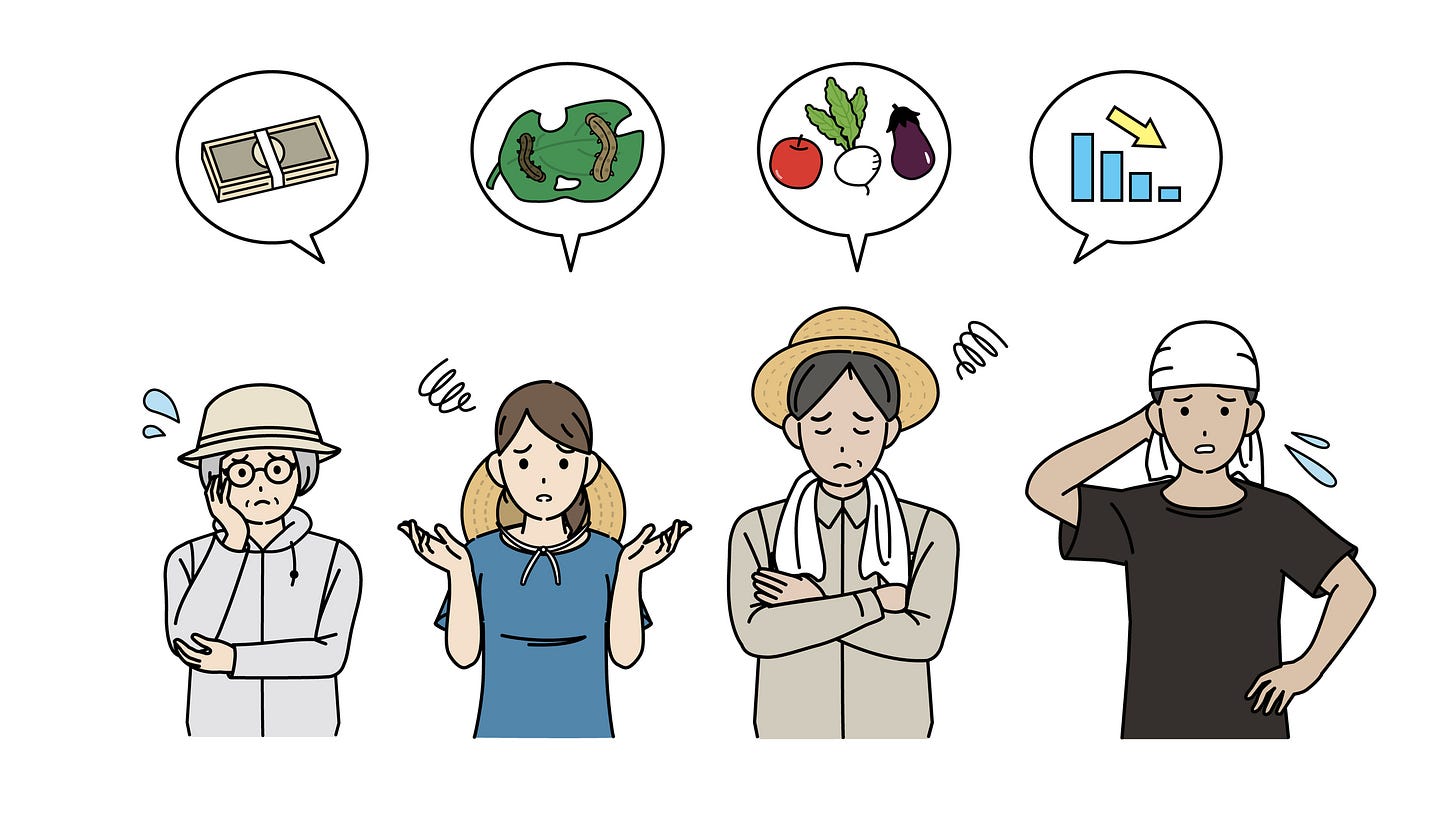The Strongmen Speaking in the Name of the Farmers (2)
Part 2: Representation matters, especially on an issue that’s so integral to our continued existence
This is a continuation of last week’s issue, because we’ve now published three more stories from our investigation into the representation of farmers. Last week, I shared the findings from France. This week, I’m sharing the findings from Germany, Italy, and Poland.
In case you missed last week’s issue (or just want to refresh your memory), here it is.
I’m also repeating this irrefutable fact:
Farmers should have representation. There is no question their concerns should be heard at both political and societal levels, and they should be supported to continue doing their job.
Let’s also be clear: That doesn’t mean there shouldn’t be any scrutiny at all. In fact, it is even more important that “representation” truly lives up to its name.
We should be able to point out if there are conflicts of interest, if the representatives barely resemble the people they are supposed to be speaking on behalf of, if the policies they are lobbying for will not help their constituents, and if questionable methods are used to maintain power.
I’m saying this again because that is a charge usually levelled at critics of big farm unions. It actually reminds me of a time when I was covering anti-Muslim violence in Myanmar and had to preface any denunciation of mindless cruelty from the Buddhists with, “I was born and raised here and I’m a practising Buddhist”.
Germany: a harbinger for the “Strategic Dialogue” in Brussels?
The dominant farm union Deutschen Bauernverbandes (DBV) has been described as “the largest and most influential lobby group for German agriculture and forestry”. It was part of a much-heralded multi-stakeholder commission to establish a roadmap for the future of agriculture, called the Zukunftskommission Landwirtschaft (ZKL).
ZKL, set up in June 2020, published its “unanimously adopted” roadmap a year later, with scenarios and proposals that are said to be “very much in line with the (Farm-to-Fork)”. There is an impression that ZKL could be a blueprint for how to do multi-stakeholder engagement.
Alas, nearly three years on, it seems none (or very little) of what has been published and agreed to have been implemented. Instead, DBV has broken multiple promises it has made, according to the German newspaper Taz, who went through the report and DBV’s subsequent actions to find examples.
In addition, sources in civil society told both Taz and Lighthouse Reports that the process ended up effectively silencing the environmental NGOs who used to be critical of DBV because they wanted to keep the peace. This allowed DBV to consolidate its power, some said.
These findings raise serious concerns about the ongoing “Strategic Dialogue on the future of EU Agriculture” in Brussels, which is modelled after the ZKL. Professor Peter Strohschneider, chair of this commission, is chairing the EU-level Dialogue.
European Commission president Ursula von der Leyen announced the Dialogue during her state of the union speech in September 2023. It was one of the first signs of the roll back of the green reforms.
There are five plenary meetings planned for the Dialogue, promoted as “a new forum to shape a shared vision for the future of the EU’s farming and food system”, with a report to be published by Summer 2024.
Copa-Cogeca has been outspoken in its support for the Dialogue. In its election manifesto published on Apr 17, it said the Dialogue is “a positive step forward” and said “its approach should be sustained throughout the 2024-2029 mandate.”
The Dialogue’s third plenary session took place on Apr 22-23 and in an e-mail response to my query, the European Commission said it is “on track to finalise its recommendations to President von der Leyen by the end of summer 2024”.
But giving Taz’s findings on the outcome of ZKL, how effective will the Dialogue be? Will the report and recommendations actually be implemented? It’s impossible to know what is being discussed as it is behind closed doors.
Oh, and the president of DBV is Joachim Rukwied. He runs his own arable and cereal farm and vineyard, which spans over 360 hectares in total, and sits on the supervisory board of BayWa AG, said to be the largest agricultural trader in Germany.
The average farm size in Germany? 63 hectares.
Italy: the might of the union meets the power of business
Anyone who has spent any prolonged periods in Italy would have come across Coldiretti even if they don’t realise it.
There’s the “Campagna Amica” (loosely translated as “Friendly Countryside”) farmers’ markets, with their bright, cheery yellow banners, run by Coldiretti.
There are the campaigns and the protests: In Palermo, Sicily, apparently more than 20,000 farmers and breeders took to the streets on Tuesday. On Wednesday in Salerno, Campania, and in Bari, Puglia, members took to the seas in rubber dinghies to approach ships they say are carrying foreign imports of lower quality, an “invasion of foreign products”. Some have been critical of the port actions.
There are the high-profile legislative wins: Italy made international headlines when it banned the production, sale, or import of cultivated meat, and this was a cause championed by Coldiretti.
There’s also the membership figures: 1.6 million, making it the leading agricultural organisation both in Italy and Europe, according to Coldiretti.
Perhaps the most impressive aspect is that Coldiretti remains close to successive governments regardless of their political affiliation, whether they’re left-wing, technocratic, conservative, or hard-right.
Our investigation with weekly magazine L’Espresso showed its links with policymakers as well as one of Italy’s biggest agricultural companies, whose subsidiary was reprimanded by Italy’s antitrust agency for bad behaviour.
Now, I’m a big believer that good journalism should be supported - besides we need to eat too - and L’Espresso relies on subscriptions, so I’m not going to reveal much more and just ask you to head down to the newsagents (or) call a friend in Italy to get you a copy. I’ll also share when the online version becomes available next week.
A side note: journalists in Italy are going through a hard time. Staff at the public broadcaster went on strike earlier this month to protest “suffocating control” by the current government. Three reporters at Domani newspaper are facing up to 9 years in jail for doing their jobs. Just before our story was published, the editor-in-chief of L’Espresso was fired for opposing editorial meddling. So please, support courageous journalism.
I will add also that despite popular perception, the face of farming in Italy is changing rapidly, like in other parts of Europe.
Government data released in Jun 2022, based on the results of the 7th General Agricultural Census, showed that almost two out of three farms disappeared between 1982 and 2020, even though agricultural land area being used has remained mostly stable.
There are significantly fewer small farms (half as many farms of less than a hectare and a third fewer for farms between 1 and 1.99 hectares) and more big farms (17.7% increase in farms of 100 hectares or more).
A View from The Europeans
Now, if you want a quick overview of the different investigations, I have just the thing for you. The latest episode from the award-winning team behind The Europeans podcast is focused on the findings of this investigation.
One of their star producers, Wojciech, joined forces with Lighthouse Reports for this project, and he, together with another veteran Polish reporter, brought us fascinating - as well as worrying - testimonies about farmer representation, corporate pressure, political power, and the murky web of influence between them.
I should add that they also brought inspiring tales of communities fighting back, and in some cases, winning, against all odds. So not all is lost.
The podcast also featured insights from several of the journalists who are involved in the investigation, including yours truly. And despite the dry subject matter, they managed to make it lively and interesting. So have your earbuds ready and have a listen the next time you go for a walk, are in commute, or heading for an exercise.
Further reading
Taz: Clever Lobbyists (in German)
L’Espresso: Grab a copy from the newsstands if you’re in the country. If not, the story will be available next Friday here.
The Europeans: The Big-Agri Bully Boys
Splann!: FNSEA's agricultural lobbying scrutinised (In French)
Lighthouse Reports: Farmers Protest, Who Gains?
Lighthouse Reports: Twitter Thread
Lighthouse Reports: LinkedIn Post
Thin’s Pickings
The Surprising Force Stalling Climate Progress: California Restaurants - Bloomberg
Fascinating piece from Ben Elgin on how The California Restaurant Association fought - and won - against efforts to make new homes and buildings more environmentally-friendly in Berkeley, and how “a coalition of gas companies and their supporters are planning to wield the restaurants’ legal victory to beat back similar rules across the western US”.
He said the latest battle mirrors how restaurants sided with the tobacco industry in the 1980s and 1990s and fought indoor smoking bans.Op-Ed: Let’s Not Kill Las Moras Springs - The Border Chronicle
A beautiful - and sobering - piece from guest writer Carolea Hassard about how one of her community’s biggest springs in Texas is now going dry as a result of over-pumping of the groundwater from cotton, corn, and hay farmers.Revealed: Far-Right Links of Polish Farmer Hunger Strikers - DeSmog
Marta Kasztelan, Clare Carlile and Phoebe Cooke on Orka, a new farmers’ movement that materialised earlier this month, and its links to far-right politicians, one of whom has been accused of anti-Semitism.
As always, please feel free to share this post and send tips and thoughts on mastodon @ThinInk@journa.host, my LinkedIn page, twitter @thinink, or via e-mail thin@thin-ink.net.







